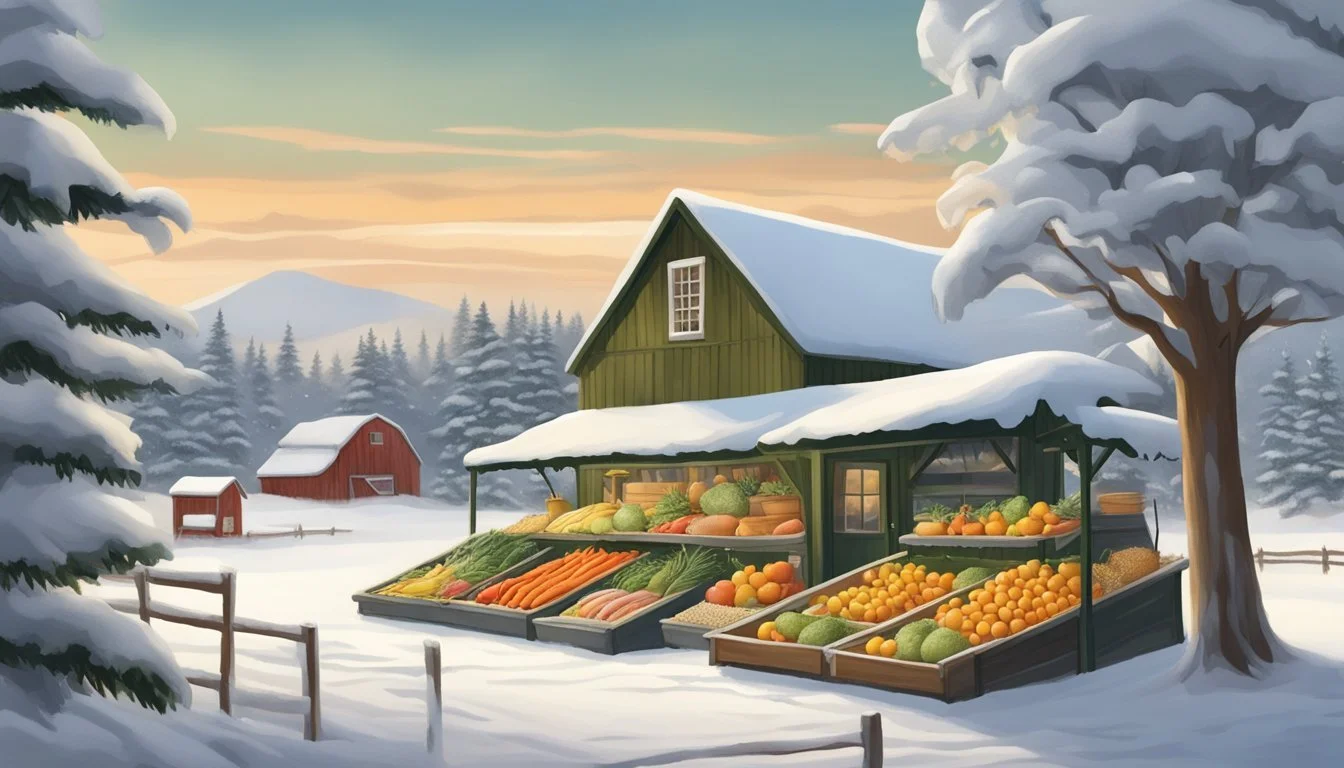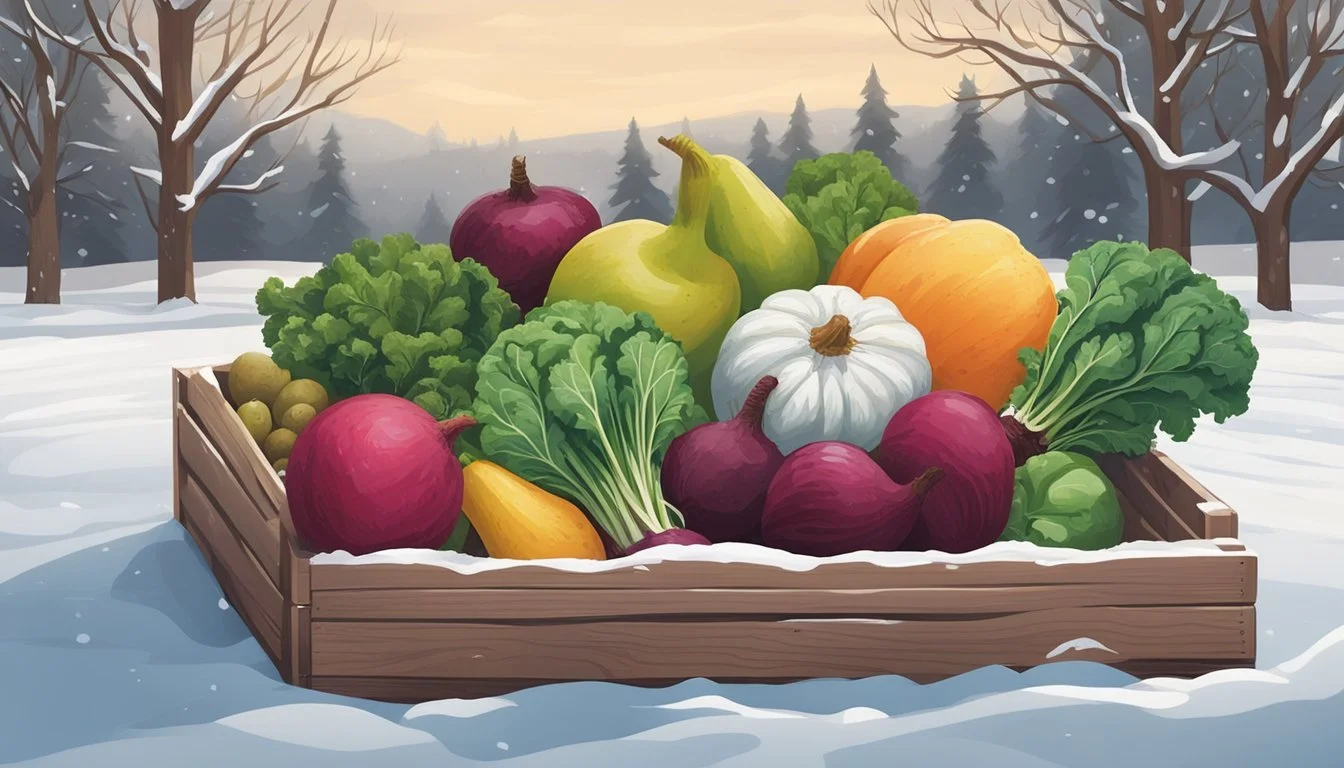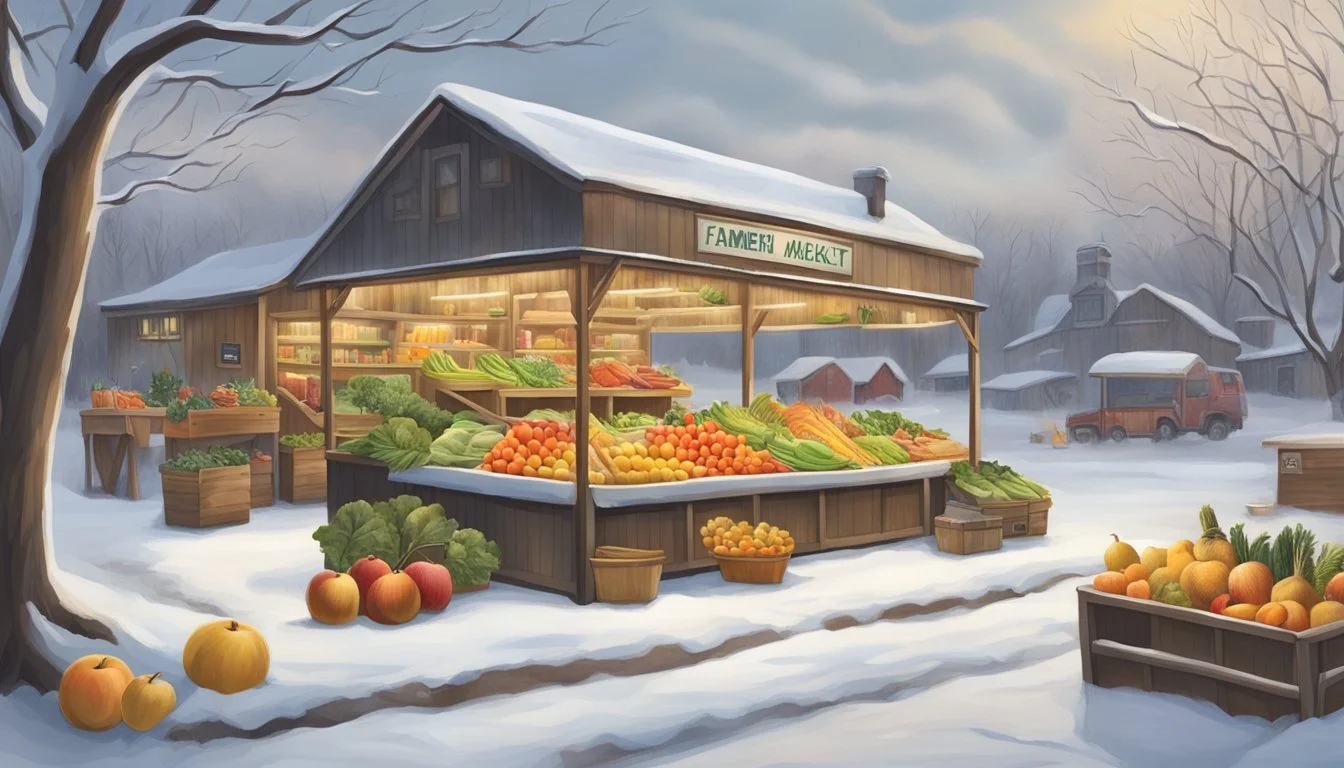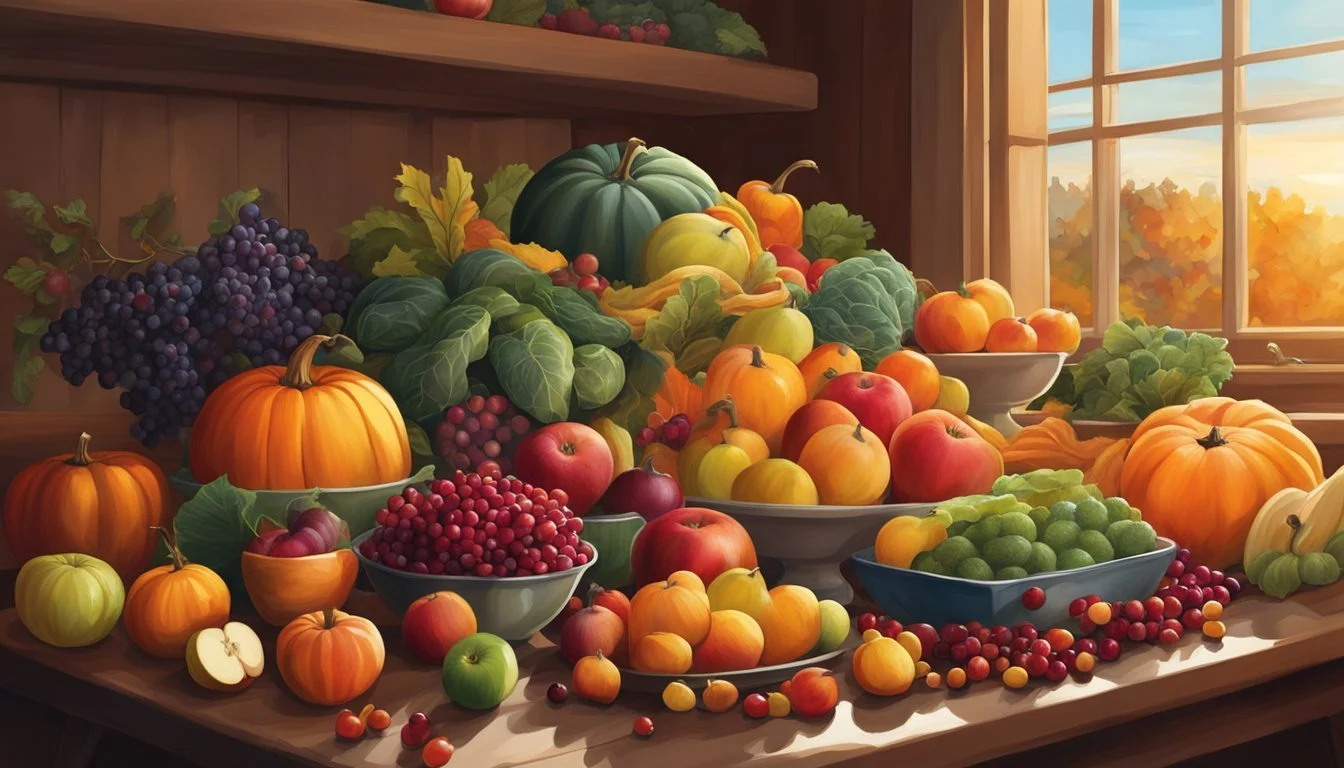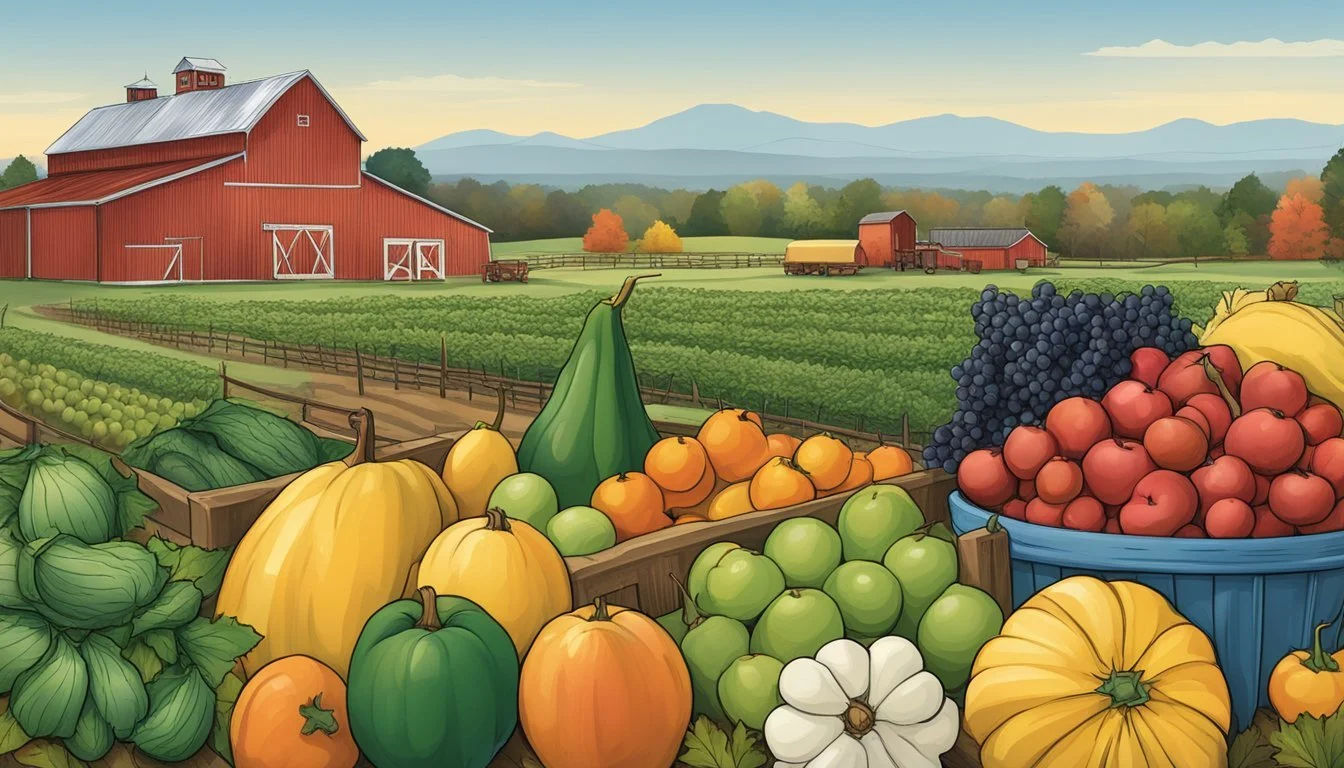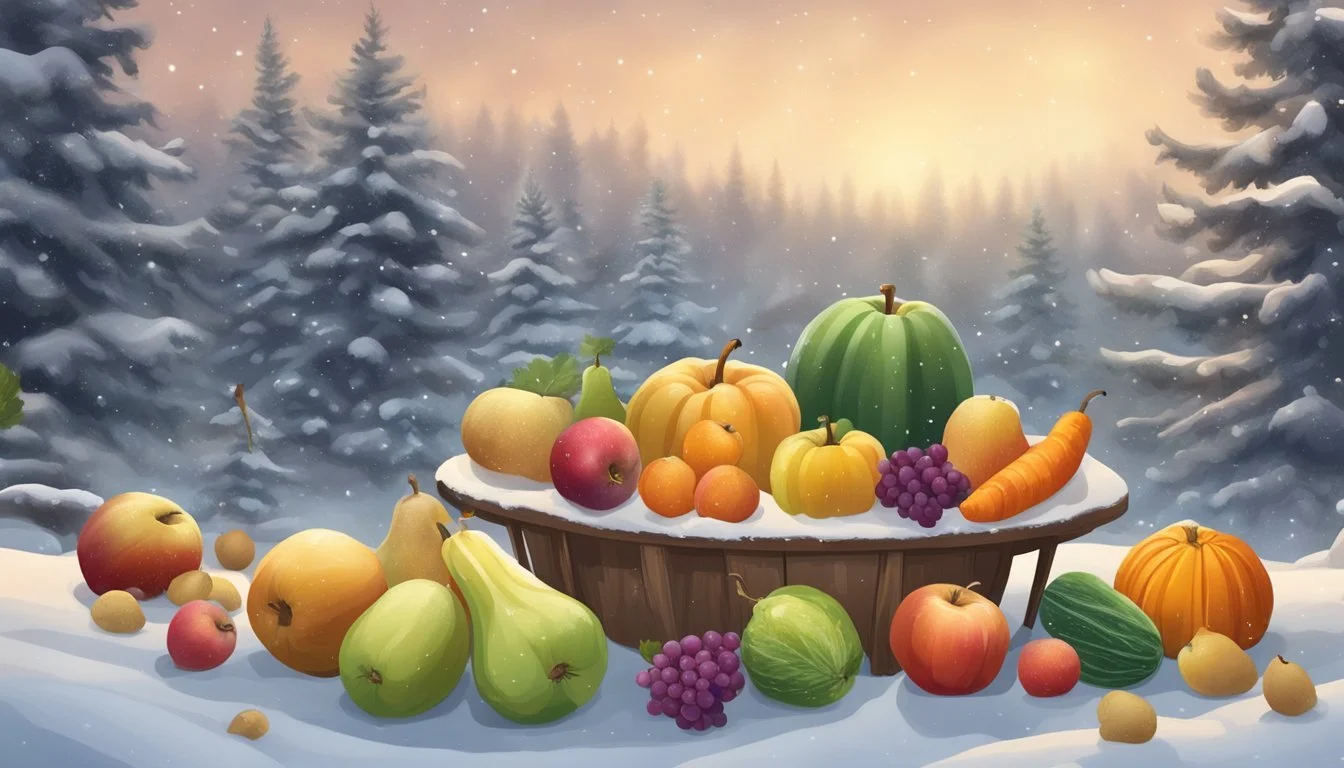Michigan Seasonal Fruit & Vegetables in December
Your Guide to Local Produce
This Article is Part of our Michigan Seasonal Fruit & Veg Calendar
In Michigan, December marks a distinct transition into the heart of winter, a season where the barren landscapes and chilling temperatures could easily be mistaken for a lack of fresh produce. However, contrary to what one might expect, this Northern state still offers a variety of fruits and vegetables that can be enjoyed during these colder months. With the use of hoop houses and other season extension techniques, local farmers continue to provide fresh, nutritious options well into the winter season.
Root vegetables are stars of the winter harvest in Michigan. Hardy selections like beets (how long do beets last?), carrots (how long do carrots last?), and parsnips have a natural sweetness that intensifies with the cold, making them perfect for an array of warming dishes. Storage crops like onions and potatoes are also readily available, having been harvested in the fall and kept in conditions conducive to longevity. Winter squash still graces the tables with its versatility, serving as a comforting ingredient in both savory and sweet preparations.
Leafy greens thrive under the protection of cold frames and greenhouses, ensuring that kale, (What wine goes well with kale?) spinach, and arugula can still be found fresh in December. While the fruit selection is more limited, apples (how long do apples last?) from the late fall harvest maintain their crispness and flavor, thanks to proper storage techniques. These seasonal offerings are a testament to Michigan's agricultural resilience and the creativity of its farmers who ensure that even in the depths of winter, the local produce can still be savored.
Understanding Michigan's Seasonal Produce Calendar
In the heart of winter, one might presume that fresh produce in Michigan is scarce, but the state's farmers still manage to supply an array of items. The seasonal produce calendar is a guide that makes shopping for fresh fruits and vegetables easier and more efficient. For those seeking local sustenance in December, understanding seasonality is key.
Michigan's winter produce tends to include storage crops and hearty vegetables that can withstand the cold. Here is what consumers can typically find during this time of year:
Root Vegetables: carrots, turnips, and beets
Winter Squash: varieties such as acorn, butternut, and spaghetti squash
Apples: stored from the fall harvest
Cold-weather Greens: kale and collards
Alliums: onions and garlic
Preserved Goods: While not fresh, many farms and markets offer goods like canned fruits, jams, and preserves, which extend the availability of local produce beyond their harvest season.
The calendar for seasonal produce is dynamic, adjusting slightly each year due to shifts in weather patterns. Buyers are encouraged to connect directly with local farmers or visit farm websites for the most precise, up-to-date information.
By following a seasonal produce calendar, individuals take part in a sustainable cycle that promotes local agriculture and reduces the greenhouse gases associated with transporting food long distances. It also ensures that the consumer enjoys fruits and vegetables at the peak of their flavor and nutritional content.
The Health Benefits of Seasonal Eating
Eating seasonally offers significant health advantages due to the freshness and nutrient density of the produce. Seasonal fruits and vegetables often contain more vitamins and minerals at their peak of ripeness. For example, produce like squash and apples, which are abundant in Michigan during the fall, are packed with vitamins such as Vitamin A and Vitamin C, essential for maintaining a strong immune system and good vision.
Here's a quick look at the benefits:
Enhanced Nutrient Intake: Seasonal produce is harvested at the right time, ensuring a higher concentration of nutrients.
Improved Immunity: Fresh, seasonal foods contain various nutrients that can help strengthen the immune system.
Seasonal eating also encourages a more diverse diet as consumers rotate their choices throughout the year. This variety is more than just appealing; it is beneficial for health. Eating a mix of fruits and vegetables minimizes the risk of nutrient deficiencies and improves overall health.
Here’s how seasonal fruits and vegetables in Michigan benefit health:
Season Benefit Winter Boosts vitamin intake during colder months Spring Provides antioxidants for detoxification Summer Offers hydrating fruits during hotter weather Fall Delivers nutrient-dense vegetables for energy
Consumers eating seasonally not only enjoy tastier produce but also contribute to a sustainable food economy. It supports local farmers and reduces the environmental impact associated with long-distance transportation. Thus, individuals who opt for seasonal produce receive the pinnacle of nutrition while fostering community and environmental health.
Winter's Bounty: Fruits Available in December
Even in the chill of December, Michigan's orchards and farms yield a heartening selection of fruits. This month's harvest is limited but features some hearty varieties capable of withstanding colder temperatures.
Apples
Michigan's apple harvest extends into early winter, offering varieties that are both versatile and flavorful. Some popular late-harvest apples include the crisp Fuji and the tart Granny Smith, perfect for fresh eating, baking, or making cider.
Pears
Pears, another resilient fruit, are available in December. Varieties like Anjou and Bosc provide a buttery and slightly sweet taste and are often enjoyed fresh or used in holiday recipes.
Cranberries
While not grown in abundance like apples and pears, cranberries are a festive highlight of the winter season. They are typically harvested before the first frost and stored, allowing them to be available fresh for December's holiday dishes.
December's Selection of Vegetables
In December, Michigan's harvest brings a bounty of cold-tolerant vegetables, particularly root varieties and hearty greens that can withstand the chilling temperatures.
Root Vegetables
Michigan winters are a prime time for root vegetables, which store energy in their roots, making them dense with nutrients and flavor. Key root vegetables available include:
Potatoes: A versatile staple that can be boiled, mashed, or roasted.
Beets: Earthy and sweet, perfect for salads, roasting, or pickling.
Carrots: Known for their crunchy texture and sweet taste, carrots are ideal for both raw and cooked dishes.
Turnips: Offering a slightly peppery flavor, turnips can be mashed or roasted.
Winter Squash
Winter squash comes into its own during the colder months, providing rich, sweet flavors and comforting textures. They can last well into winter when stored properly. Notable winter squash varieties are:
Butternut Squash: (how long does butternut squash last?) With a sweet, nutty taste, it's great for soups and purees.
Acorn Squash: Characterized by its ridged skin and sweet, tender flesh.
Leafy Greens
Even in the brisk winter climate, some leafy greens thrive and are available in December, often with a more concentrated flavor from the frosts:
Kale: This hearty green is rich in nutrients and can be used in everything from salads to stews.
Collard Greens: Known for their slightly bitter taste and often used in slow-cooked dishes.
Where to Find Fresh Produce in Winter
In December, sourcing fresh fruits and vegetables in Michigan requires visiting local venues that offer produce adapted to the cold season. Consumers can usually find a selection at certain farmers markets and various grocery stores.
Farmers Markets
Winter farmers markets in Michigan are key destinations for fresh and locally-grown produce, even during the colder months. These markets often feature storage crops such as apples and pears, as well as greenhouse-grown offerings when available. Visitors to these markets can expect:
Hearty root vegetables: Such as carrots and potatoes
Winter squash: Including varieties like butternut and acorn
Leafy Greens: Often greenhouse-grown to ensure freshness
Local farms may also have stalls at these farmers markets, providing consumers with an opportunity to support the regional agricultural community directly.
Grocery Stores
Grocery stores play a significant role in providing a diverse array of produce throughout winter. They often source fruits and vegetables from a variety of places, including:
Local farms with cold storage capabilities
Farms using season extension methods to grow produce
Imported goods to supplement what cannot be locally grown or stored
While grocery stores may not always carry the same local assortment found at farmer's markets, they provide a consistent and accessible option for consumers seeking variety in their produce choices.
Preserving December's Harvest
In December, Michigan's seasonal bounty slows down, but preservation remains a critical practice for extending the life of any available crops. Homeowners prepare for the colder months by preserving produce to maintain a supply of nutritious foods.
Freezing is an excellent option for certain fruits and vegetables. It involves simple steps:
Select fresh, ripe produce.
Clean and prepare according to type.
Blanch if necessary to preserve flavor and texture.
Cool, drain, and pack into airtight containers or freezer bags.
For instance, root vegetables such as carrots and beets can be effectively stored in a cool, dark place. Immature potatoes are ideally kept in moderately cool (45-50°F) conditions, while not exposing them to light to prevent greening.
When it comes to preservation, homeowners have multiple techniques:
Canning: Suitable for high-acid foods and recipes that include added acids.
Drying: Works well for herbs and some hearty vegetables like winter squash.
Below is a simple reference table for common preservation methods for Michigan winter produce:
Produce Storage Preservation Method Apples Cool storage Canning, Freezing Beets Root cellar Pickling, Freezing Cabbage Refrigerated Fermentation, Freezing Carrots Root cellar Freezing, Blanching Winter Squash Cool storage Canning, Freezing, Drying
Individuals considering home preservation must ensure they follow updated safety guidelines to prevent foodborne illnesses and to retain nutritional value. Proper labeling with the date of preservation helps track shelf life and maintain an organized inventory.
Cooking with Michigan's December Produce
Michigan's winter climate calls for hearty meals that offer both warmth and nourishment. December’s produce lends itself well to comfort foods that satisfy during the colder days.
Soups and Stews
Soups and stews are staples of wintertime comfort. They highlight ingredients like kale, Brussels sprouts (how long do brussels sprouts last?), and broccoli, which are plentiful in December. A kale and white bean soup provides a nourishing meal that is both comforting and simple to prepare. Brussels sprouts can be shaved thin and added to a chicken stew for a delightful crunch and added nutrition.
Casseroles and Bakes
Casseroles and bakes are versatile and can integrate a variety of Michigan's December vegetables. A staple recipe might be a sweet potato casserole, enhanced with a hint of Michigan maple syrup for a touch of sweetness. Root vegetables such as rutabaga, turnips, and potatoes, are excellent for layering in hearty bakes that emerge caramelized and tender from the oven.
Healthy Snacks
Healthy snacks in December take advantage of the crisp, fresh flavors of the season. Broccoli florets can be roasted with a sprinkle of cheese for a quick snack. For a refreshing option, a smoothie made with seasonal cruciferous vegetables and a dash of citrus fruit offers a vibrant burst of flavor and nutrition. Smoothies provide a creative avenue to incorporate produce like kale and apples into everyday snacking.
Supporting Michigan Farms and Agriculture
Michigan's agricultural sector significantly contributes to the local economy and sustainability. Farms across the state provide a magnitude of fruits and vegetables, with December offerings being more limited due to the climate. However, supporting local agriculture during this month can still be impactful.
Purchasing local produce not only bolsters farmers' incomes but also reduces environmental footprints by minimizing transportation distances. The diverse array of Michigan farms, from those offering winter-hardy crops to indoor-grown greens, ensures there is still fresh, local produce available.
Businesses and consumers can support the agricultural community by seeking out and purchasing Michigan-grown goods. This demand encourages the preservation of farming as a vital part of Michigan's economy and promotes the environmental benefit of reduced transport for produce.
Agencies such as the Michigan Department of Agriculture and Rural Development work in conjunction with Michigan State University to aid in the environmental sustainability of farming practices. They focus on climate resiliency and resource efficiency to ensure that local farmers and their businesses are supported scientifically and economically.
To support Michigan agriculture effectively:
Choose Local: Whenever possible, buy Michigan-grown produce.
Seasonal Awareness: Understand what is in season and support farmers who grow these crops.
Invest in Community: Participate in community-supported agriculture (CSA) programs.
By engaging with and supporting Michigan agriculture, consumers play a pivotal role in the survival and prosperity of local farms, which in turn benefits the state's environment and its economy.
A Guide to Michigan's Farmers Markets in Winter
Michigan's winter farmers markets are unique, offering a rich variety of local produce despite the cold climate. Visitors keen on supporting local farmers and enjoying fresh, seasonal produce can still find an impressive selection.
Farmers in Michigan adapt to the winter season by providing storage crops and utilizing greenhouses. This means that even during the chill of December, farmers markets brim with hearty vegetables and preserves. Root vegetables like carrots, turnips, and beets are common, alongside winter squash and potatoes.
Leafy greens persist thanks to indoor growing techniques, and one can often find spinach, kale, and arugula.
Seasonal Fruits and Vegetables Available:
Apples
Beets
Brussels sprouts
Cabbages
Carrots
Potatoes
Squash
Turnips
Shoppers are encouraged to use the Michigan Produce Seasonality Guide to pinpoint exact times for the best quality and variety. Here is a snapshot of what to expect:
Produce Type Examples Root Vegetables Beets, Carrots, Potatoes Winter Squash Butternut, Acorn Leafy Greens Spinach, Kale
The markets also often feature goods like honey, baked items, and jarred preserves, perfect for holidays and gifts.
For individuals seeking more specific information, one can search by zip code for nearby market locations, hours of operation, and available produce. This empowers consumers with the necessary knowledge to make informed purchases and supports local agriculture during Michigan's winter season.
Seasonal Recipes for December in Michigan
December in Michigan calls for heartwarming dishes made with the freshest local produce. Root vegetables and hearty greens dominate the table, offering both nutrition and comfort during the cold season.
Hearty Vegetable Stew with Michigan Roots This rustic stew highlights Michigan’s winter produce, featuring turnips, parsnips, carrots, and potatoes. One can enhance the flavor by using fresh herbs like thyme and rosemary.
Ingredients:
Carrots
Potatoes
Parsnips
Turnips
Method:
Chop the vegetables into bite-sized pieces.
Simmer with herbs until tender and flavorful.
Cranberry and Pomegranate Salad Bright cranberries and juicy pomegranates provide a tart contrast to any meal. Tossed with crisp local greens, they make a refreshing salad that bursts with flavor.
Ingredients:
Mix of local greens (kale, collard greens)
Cranberries
Pomegranate seeds (how long do pomegranate seeds last?)
Method:
Combine the greens, cranberries, and pomegranate seeds.
Toss with a light vinaigrette dressing.
Butternut Squash Soup with a Twist The sweet and nutty flavors of butternut squash are ideally complemented by the subtle spiciness of Michigan-grown radishes, making for a warming soup.
Ingredients:
Butternut squash
Radishes
Onion
Vegetable broth
Method:
Roast the butternut squash and radishes until caramelized.
Blend with sautéed onion and broth until smooth.
By integrating these seasonal crops into recipes, individuals support local agriculture and enjoy food at its peak of freshness and flavor. December's harvest brings comfort and nutrition to Michigan’s homes during the chill of winter.
Frequently Asked Questions About Michigan Produce
What produce is available in Michigan during December?
In December, Michigan offers a variety of storage crops and greenhouse-grown produce. Consumers can find:
Apples (stored from fall harvest)
Root vegetables like carrots, beets, and potatoes
Winter squash
Cabbage
Greens from hoop houses, such as kale and spinach
Where can individuals find information on seasonal produce?
Residents can access various resources for information on Michigan's seasonal produce:
MSU Extension provides guides and educational materials.
Michigan Fresh has resources to help connect consumers with fresh, seasonal food.
How can consumers purchase seasonal Michigan produce in the winter?
Michigan's winter produce can be purchased through:
Farmers markets that operate year-round
Local grocery stores that source from Michigan producers
CSA (Community Supported Agriculture) programs that offer winter shares
Are there benefits to eating seasonally in Michigan?
Eating seasonally provides benefits such as:
Nutritional value: Fresh, in-season produce may retain more nutrients.
Economic: Supporting local farmers can benefit the Michigan economy.
Taste: Seasonal produce often tastes better due to peak ripeness.
Does Michigan offer resources for finding local produce?
Yes, consumers can use these tools to find local Michigan produce:
Michigan Farmers Market Association: A directory of markets
LocalHarvest: A search tool for CSAs and local farms


